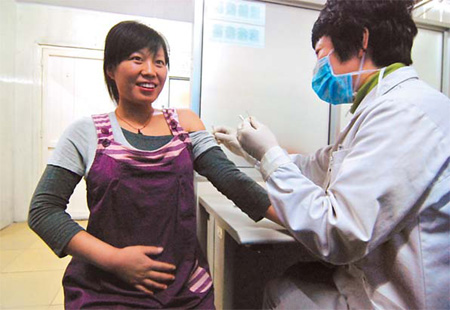Society
Miscarriages, H1N1 shots 'not linked'
By Shan Juan (China Daily)
Updated: 2010-01-29 07:03
 |
Large Medium Small |
|
 A pregnant woman receives the H1N1 vaccine in Qingdao, East China’s Shandong province, on Dec 30, 2009.[China Daily] |
Flu vaccine still recommended for pregnant women at high risk
Several pregnant women had miscarriages after receiving the H1N1 flu vaccine on the Chinese mainland but the cases were not linked to the shots themselves, China's vaccine chief said yesterday.
Liang Xiaofeng, director of the Chinese Center for Disease Control and Prevention's (CDC) immunization center, did not give further details on the exact number of miscarriages detected among about 10,000 would-be mothers who chose to receive the shot so far.
Most of the victims reported are women who were three months pregnant or less, Liang said.
About 15 percent of recognized pregnancies will end in a miscarriage, studies have found. More than 80 percent of miscarriages occur within the first three months of pregnancy.
"The miscarriages detected were all coincidental. In other words, without receiving the vaccine, it may still happen," Liang said.
However, by weighing the benefits and risks, pregnant women, who make up nearly 14 percent of the total number of reported deaths from the A/H1N1 flu on the mainland, should get the shot as long as the pandemic is still ongoing, he said.
A large majority of pregnant women are reportedly skeptical of the vaccine, particularly when the pandemic continues to be at low levels as it has been in past weeks.
Deng Ying, director of the Beijing CDC, told China Daily no pregnant women in the capital had to date received the H1N1 flu vaccination, which has been free and voluntary.
A Beijing-based would-be mother surnamed Liu, 31, who is expecting her baby in a month, said: "I've heard that no vaccine is risk free, so I have not gotten the jab for fear of potential side effects and harm to both me and the baby."
In Hong Kong, two women had reportedly suffered stillbirths and another four suffered spontaneous abortions after receiving the H1N1 vaccination in late December.
Local health authorities said they have found no link so far between the incidents and the vaccine.
That has further dampened Hong Kong people's enthusiasm toward the vaccination, said director of the Center for Health Protection, Thomas Tsang Ho-fai.
The "underwhelming" response to the vaccine might leave Hong Kong with plenty of unused doses, he said.
More than 68 million people on the mainland received the jab as of Monday.












